BusinessEurope Headlines No. 2015-40
COP21: Ministers’ last chance to reach meaningful agreement
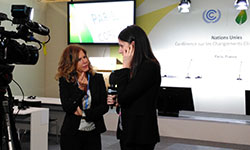 BusinessEurope President Emma Marcegaglia is present at COP21 in Paris. As the deadline for reaching an agreement approaches, Ms Marcegaglia told EU delegates that time is running out to reach a universal, ambitious and far-reaching legally binding agreement. She called for strong collective efforts to tackle this global challenge and stressed we cannot risk failure on the last days at COP21. In the margins of negotiations she participated in a roundtable with world business representatives hosted by the President of MEDEF, Pierre Gattaz, to present global business views on the Paris agreement.
BusinessEurope President Emma Marcegaglia is present at COP21 in Paris. As the deadline for reaching an agreement approaches, Ms Marcegaglia told EU delegates that time is running out to reach a universal, ambitious and far-reaching legally binding agreement. She called for strong collective efforts to tackle this global challenge and stressed we cannot risk failure on the last days at COP21. In the margins of negotiations she participated in a roundtable with world business representatives hosted by the President of MEDEF, Pierre Gattaz, to present global business views on the Paris agreement.
Read more, play video or contact: Alexandre Affre
ASGroup CEO event 2015
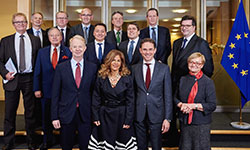 On 3 December, President Emma Marcegaglia, Director General Markus J. Beyrer, Vice-Presidents of BusinessEurope and CEOs of the Advisory and Support Group gathered in Brussels and met EU leaders. The group exchanged views with Vice-President Jyrki Katainen on the challenges the EU is facing and on how to trigger investment in Europe. With First Vice-President Frans Timmermans and Secretary-General Alexander Italianer, CEOs discussed how to truly design better regulation to create growth and jobs and improve Europe’s competitiveness. The group also met Commissioner Günther Oettinger to discuss digitalisation of the industry, development of the digital economy and exchanged views with Commissioner Carlos Moedas on boosting innovation and benefiting from new technologies. Contact: Jérôme P. Chauvin
On 3 December, President Emma Marcegaglia, Director General Markus J. Beyrer, Vice-Presidents of BusinessEurope and CEOs of the Advisory and Support Group gathered in Brussels and met EU leaders. The group exchanged views with Vice-President Jyrki Katainen on the challenges the EU is facing and on how to trigger investment in Europe. With First Vice-President Frans Timmermans and Secretary-General Alexander Italianer, CEOs discussed how to truly design better regulation to create growth and jobs and improve Europe’s competitiveness. The group also met Commissioner Günther Oettinger to discuss digitalisation of the industry, development of the digital economy and exchanged views with Commissioner Carlos Moedas on boosting innovation and benefiting from new technologies. Contact: Jérôme P. Chauvin
Joint responsibility to improve corporate governance culture
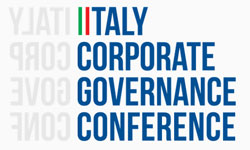 Corporate governance codes remain the constitutional charters of governance and a reference model for companies. Their main features – voluntary nature and flexibility through comply or explain – are fundamental to help corporate systems and companies to adapt swiftly to new challenges and trends. The role of institutional investors and proxy advisors, and not only of boards, is becoming increasingly important to ensure a better compliance culture. The emergence of stewardship codes in several countries is a response to this need. These messages were conveyed by BusinessEurope’s President Emma Marcegaglia during the Italy Corporate Governance Conference, held on 4 December in the Stock Exchange Palace in Milano in presence of the Italian Minister of Economy and Finances Pier Carlo Padoan among others.
Corporate governance codes remain the constitutional charters of governance and a reference model for companies. Their main features – voluntary nature and flexibility through comply or explain – are fundamental to help corporate systems and companies to adapt swiftly to new challenges and trends. The role of institutional investors and proxy advisors, and not only of boards, is becoming increasingly important to ensure a better compliance culture. The emergence of stewardship codes in several countries is a response to this need. These messages were conveyed by BusinessEurope’s President Emma Marcegaglia during the Italy Corporate Governance Conference, held on 4 December in the Stock Exchange Palace in Milano in presence of the Italian Minister of Economy and Finances Pier Carlo Padoan among others.
Contact: Pedro Oliveira
Dutch EU Presidency: rethinking the EU debate on posting of workers
 The European Commission’s recent decision to postpone the labour mobility package is an opportunity to rethink fundamentally the proposed targeted revision of the posting of workers directive to introduce a new principle of “equal pay for equal work at the same place”. The posting of workers directive does not need to be revised as it provides fair competition between enterprises in the single market and adequate protection for posted workers. BusinessEurope would support efforts of the Dutch Presidency to refocus the EU debate on achieving good implementation of the 2014 enforcement directive. If needed, the next months could also be useful to explore whether some issues relating to the interpretation of the existing rules in the 1996 directive may require more clarity. These were the key messages given by Director General Markus J. Beyrer during a meeting on 7 December with Minister Lodewijk Asscher to discuss the social affairs priorities of the upcoming Dutch Presidency of the EU Council.
The European Commission’s recent decision to postpone the labour mobility package is an opportunity to rethink fundamentally the proposed targeted revision of the posting of workers directive to introduce a new principle of “equal pay for equal work at the same place”. The posting of workers directive does not need to be revised as it provides fair competition between enterprises in the single market and adequate protection for posted workers. BusinessEurope would support efforts of the Dutch Presidency to refocus the EU debate on achieving good implementation of the 2014 enforcement directive. If needed, the next months could also be useful to explore whether some issues relating to the interpretation of the existing rules in the 1996 directive may require more clarity. These were the key messages given by Director General Markus J. Beyrer during a meeting on 7 December with Minister Lodewijk Asscher to discuss the social affairs priorities of the upcoming Dutch Presidency of the EU Council.
Contact: Maxime Cerutti
European and Canadian business in support of CETA
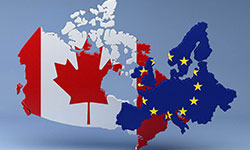 BusinessEurope, together with 16 other business organisations from Canada and the EU, wrote a letter to Presidents Juncker, Tusk and Schulz and Canadian Prime Minister Trudeau, strongly supporting the approval and provisional application of CETA - the Comprehensive, Economic and Trade Agreement. CETA is the most ambitious and comprehensive agreement the EU has ever concluded with a developed economy, with expected benefits in a number of key areas for European business like public procurement, services or intellectual property. Read more or contact: Eleonora Catella
BusinessEurope, together with 16 other business organisations from Canada and the EU, wrote a letter to Presidents Juncker, Tusk and Schulz and Canadian Prime Minister Trudeau, strongly supporting the approval and provisional application of CETA - the Comprehensive, Economic and Trade Agreement. CETA is the most ambitious and comprehensive agreement the EU has ever concluded with a developed economy, with expected benefits in a number of key areas for European business like public procurement, services or intellectual property. Read more or contact: Eleonora Catella
Improving the regulatory process
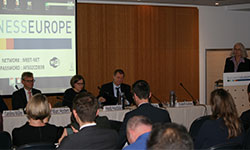 Progress in establishing the conditions to improve the way OECD countries and the EU regulate were debated at the 9 December BusinessEurope and BIAC seminar “Improving the regulatory process” by representatives from the OECD, European Commission, European Parliament, European Court of Auditors, member states and stakeholder organisations. The discussion was based on a presentation of the 2015 OECD Regulatory Policy Outlook. Participants also examined how EU institutions can work better together to improve the regulatory process and how the European Commission’s proposal for an interinstitutional agreement on better regulation could contribute to this. Contact: Erik Berggren
Progress in establishing the conditions to improve the way OECD countries and the EU regulate were debated at the 9 December BusinessEurope and BIAC seminar “Improving the regulatory process” by representatives from the OECD, European Commission, European Parliament, European Court of Auditors, member states and stakeholder organisations. The discussion was based on a presentation of the 2015 OECD Regulatory Policy Outlook. Participants also examined how EU institutions can work better together to improve the regulatory process and how the European Commission’s proposal for an interinstitutional agreement on better regulation could contribute to this. Contact: Erik Berggren
Businesses can play a positive role in achieving sustainable global value chains
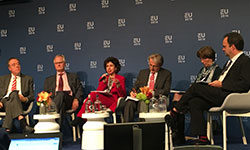 Businesses today recognise and are better prepared to respond to their societal role and they implement a number of sustainable practices. This is the position that Luisa Santos, International Relations Director at BusinessEurope, supported in her address at the “EU and Global Value Chains – implementing sustainable business through aid and trade” conference, organised in Amsterdam on 7 December by the Dutch Ministry of Foreign Affairs. It is proven however that in order for these efforts to be effective, coordination and support with governments and institutions are crucial. In this regard, the EU should further promote public-private dialogue and partnerships and create incentives for more businesses to engage in responsible practices. In the past years, the EU has indeed intensified its efforts to bring trade and development policies closer together, for instance through its generalised system of preferences and the inclusion of sustainability chapters in EU free-trade agreements. However, more needs to be done to make policies more complementary. Development of an EU economic diplomacy would be key in this regard.
Businesses today recognise and are better prepared to respond to their societal role and they implement a number of sustainable practices. This is the position that Luisa Santos, International Relations Director at BusinessEurope, supported in her address at the “EU and Global Value Chains – implementing sustainable business through aid and trade” conference, organised in Amsterdam on 7 December by the Dutch Ministry of Foreign Affairs. It is proven however that in order for these efforts to be effective, coordination and support with governments and institutions are crucial. In this regard, the EU should further promote public-private dialogue and partnerships and create incentives for more businesses to engage in responsible practices. In the past years, the EU has indeed intensified its efforts to bring trade and development policies closer together, for instance through its generalised system of preferences and the inclusion of sustainability chapters in EU free-trade agreements. However, more needs to be done to make policies more complementary. Development of an EU economic diplomacy would be key in this regard.
Contact: Sofia Bournou
Modernisation of the EU-Turkey Customs Union: an opportunity for businesses
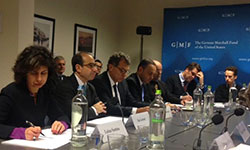 Since the intention to update the Customs Union between the EU and Turkey was announced in May 2015, the public debate has well started. An event to discuss this issue was organised on 8 December in Brussels by the German Marshal Fund of the US and TÜSIAD. BusinessEurope International Relations Director Luisa Santos highlighted the mutual benefits that modernisation of the Customs Union would bring for EU and Turkish companies, especially SMEs. The current agreement only covers industrial goods and processed agricultural goods. However, by updating the Customs Union, we have the possibility to increase its scope in order to include provisions on services, public procurement and agriculture. This would not only deepen bilateral trade and economic relations but increase harmonisation in the regulatory environment where businesses operate. The European Commission is currently in the process of conducting an impact assessment, while a public consultation is planned to take place in spring 2016. It is only after these stages that the political process will begin.
Since the intention to update the Customs Union between the EU and Turkey was announced in May 2015, the public debate has well started. An event to discuss this issue was organised on 8 December in Brussels by the German Marshal Fund of the US and TÜSIAD. BusinessEurope International Relations Director Luisa Santos highlighted the mutual benefits that modernisation of the Customs Union would bring for EU and Turkish companies, especially SMEs. The current agreement only covers industrial goods and processed agricultural goods. However, by updating the Customs Union, we have the possibility to increase its scope in order to include provisions on services, public procurement and agriculture. This would not only deepen bilateral trade and economic relations but increase harmonisation in the regulatory environment where businesses operate. The European Commission is currently in the process of conducting an impact assessment, while a public consultation is planned to take place in spring 2016. It is only after these stages that the political process will begin.
Contact: Sofia Bournou
Employers participate in Asia-Europe Labour Minister conference in Sofia
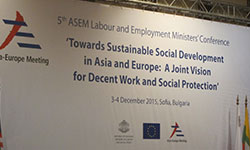 Employers in Europe and in Asia share some common labour market challenges as part of the global economy. For example, employers in both continents call for improved skills development to respond to the rapidly changing needs of companies. At the same time, both regions have to deal with region-specific challenges. In Europe, we have highly developed social systems, but urgent actions are needed to ensure that employment and social policies better contribute to competitiveness, growth and employment, and to financially sustainable social systems. Exchanges between employers and social partners in the context of EU-ASEM can be useful to help both regions learn from each other and cooperate to respond effectively to common and/or specific labour market challenges. Stemming from their discussions and exchanges with trade unions during a social partner forum, European and Asian employers addressed common messages during the 5th ASEM Labour and Employment Ministers Conference "Towards Sustainable Social Development in Asia and Europe: A Joint Vision for Decent Work and Social Protection" held in Sofia on 3 December 2015.
Employers in Europe and in Asia share some common labour market challenges as part of the global economy. For example, employers in both continents call for improved skills development to respond to the rapidly changing needs of companies. At the same time, both regions have to deal with region-specific challenges. In Europe, we have highly developed social systems, but urgent actions are needed to ensure that employment and social policies better contribute to competitiveness, growth and employment, and to financially sustainable social systems. Exchanges between employers and social partners in the context of EU-ASEM can be useful to help both regions learn from each other and cooperate to respond effectively to common and/or specific labour market challenges. Stemming from their discussions and exchanges with trade unions during a social partner forum, European and Asian employers addressed common messages during the 5th ASEM Labour and Employment Ministers Conference "Towards Sustainable Social Development in Asia and Europe: A Joint Vision for Decent Work and Social Protection" held in Sofia on 3 December 2015.
Read more or contact: Maxime Cerutti
What’s the impact of the new Union Customs Code?
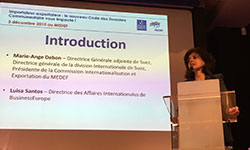 Regarding modernisation of the Union Customs Code, two important objectives of European business are that the new code introduces simplifications in customs processes and leads to innovative solutions for economic operators. BusinessEurope has been actively involved in the modernisation of the Union Customs Code, Director for International Relations Luisa Santos explained at a conference organised by MEDEF on 3 December. “We will keep engaging the European Commission in order to achieve these objectives”, she stressed. The conference consisted of panel discussions both with French customs authorities and customs experts from different companies. The Union Customs Code is scheduled to enter into force on 1 May 2016.
Regarding modernisation of the Union Customs Code, two important objectives of European business are that the new code introduces simplifications in customs processes and leads to innovative solutions for economic operators. BusinessEurope has been actively involved in the modernisation of the Union Customs Code, Director for International Relations Luisa Santos explained at a conference organised by MEDEF on 3 December. “We will keep engaging the European Commission in order to achieve these objectives”, she stressed. The conference consisted of panel discussions both with French customs authorities and customs experts from different companies. The Union Customs Code is scheduled to enter into force on 1 May 2016.
Contact: Maurice Fermont
Implementation and enforcement of single market rules to be a priority both at EU and national levels
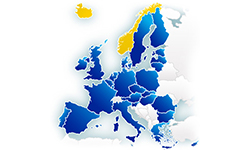 Enforcement, governance and implementation of single market rules should be the core of the upcoming individual proposals announced by the European Commission in the single market strategy. Speaking at a European Policy Centre (EPC) roundtable on the single market on 2 December, BusinessEurope Deputy Director Guido Lobrano highlighted that it is now important to ensure member states support for the strategy’s initiatives at national level. On the specific proposals related to services, the announced passport can help in principle, but would not solve the problems related to diverse national requirements for providing services in a different country. On geo-blocking, Guido Lobrano highlighted its complexity and the need to allow for an assessment of differentiated treatment on a case-by-case basis.
Enforcement, governance and implementation of single market rules should be the core of the upcoming individual proposals announced by the European Commission in the single market strategy. Speaking at a European Policy Centre (EPC) roundtable on the single market on 2 December, BusinessEurope Deputy Director Guido Lobrano highlighted that it is now important to ensure member states support for the strategy’s initiatives at national level. On the specific proposals related to services, the announced passport can help in principle, but would not solve the problems related to diverse national requirements for providing services in a different country. On geo-blocking, Guido Lobrano highlighted its complexity and the need to allow for an assessment of differentiated treatment on a case-by-case basis.
Read more or contact: Guido Lobrano
There’s great growth potential in cross-border services
 While services account for about 70% of EU GDP and employment, only 6% of all services in the EU are provided across borders. This is mainly due to remaining obstacles to free movement that need to be removed urgently to create growth, jobs and enhance Europe’s competitiveness. This was stressed by BusinessEurope Adviser Jeroen Hardenbol at a single market conference organised by the British Chamber of Commerce in Belgium on 4 December. The new European Commission single market strategy rightly focuses on services and contains a number of good proposals to unleash the growth potential, such as a legal instrument to improve the current notification procedure for services. BusinessEurope also supports the idea of a services passport for business services and construction, but much will depend on the details of the proposal.
While services account for about 70% of EU GDP and employment, only 6% of all services in the EU are provided across borders. This is mainly due to remaining obstacles to free movement that need to be removed urgently to create growth, jobs and enhance Europe’s competitiveness. This was stressed by BusinessEurope Adviser Jeroen Hardenbol at a single market conference organised by the British Chamber of Commerce in Belgium on 4 December. The new European Commission single market strategy rightly focuses on services and contains a number of good proposals to unleash the growth potential, such as a legal instrument to improve the current notification procedure for services. BusinessEurope also supports the idea of a services passport for business services and construction, but much will depend on the details of the proposal.
Read more or contact: Jeroen Hardenbol
Calendar
 14-15 December 2015: Foreign Affairs Council meeting
14-15 December 2015: Foreign Affairs Council meeting- 15 December 2015: Transforming Europe towards the digital age, Luxembourg
- 15-18 December 2015: 10th WTO ministerial conference, Nairobi
- 17-18 December 2015: Meeting of the European Council
Contact: BusinessEurope Headlines